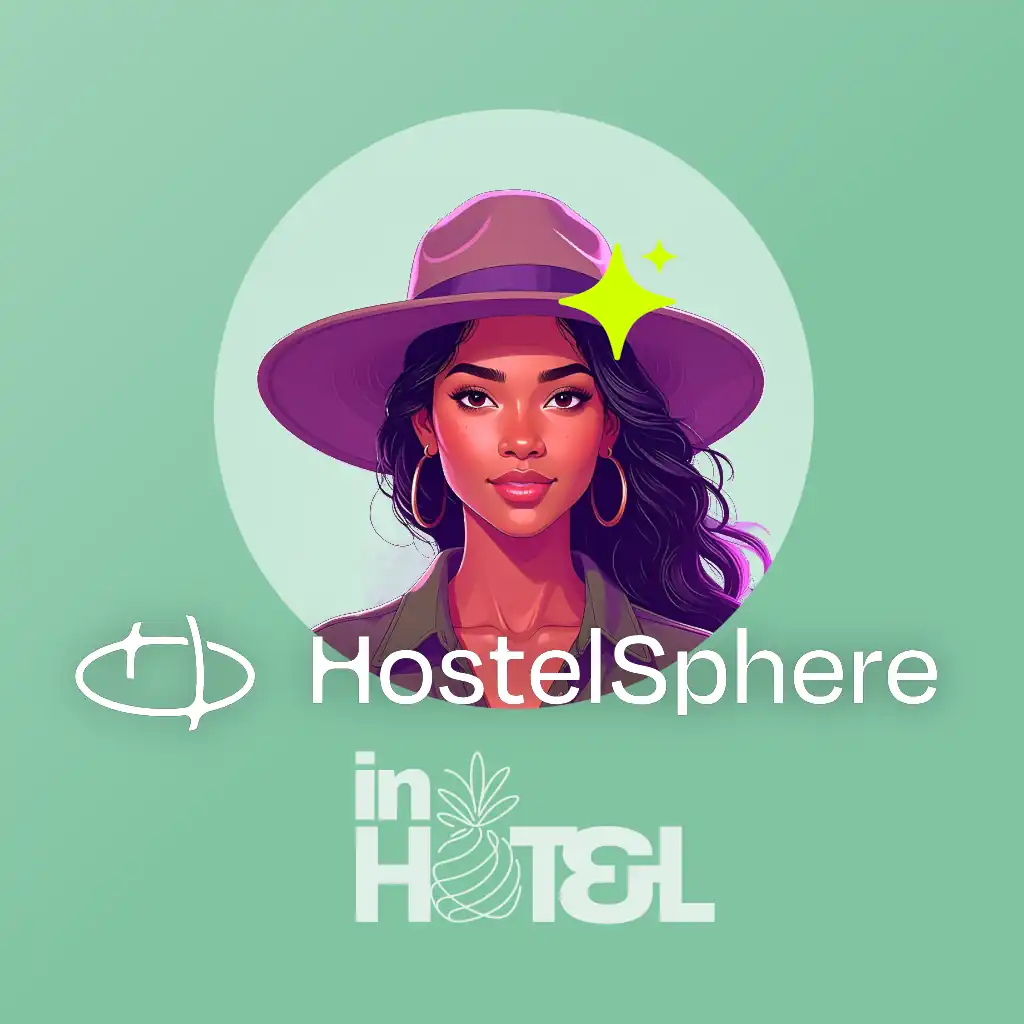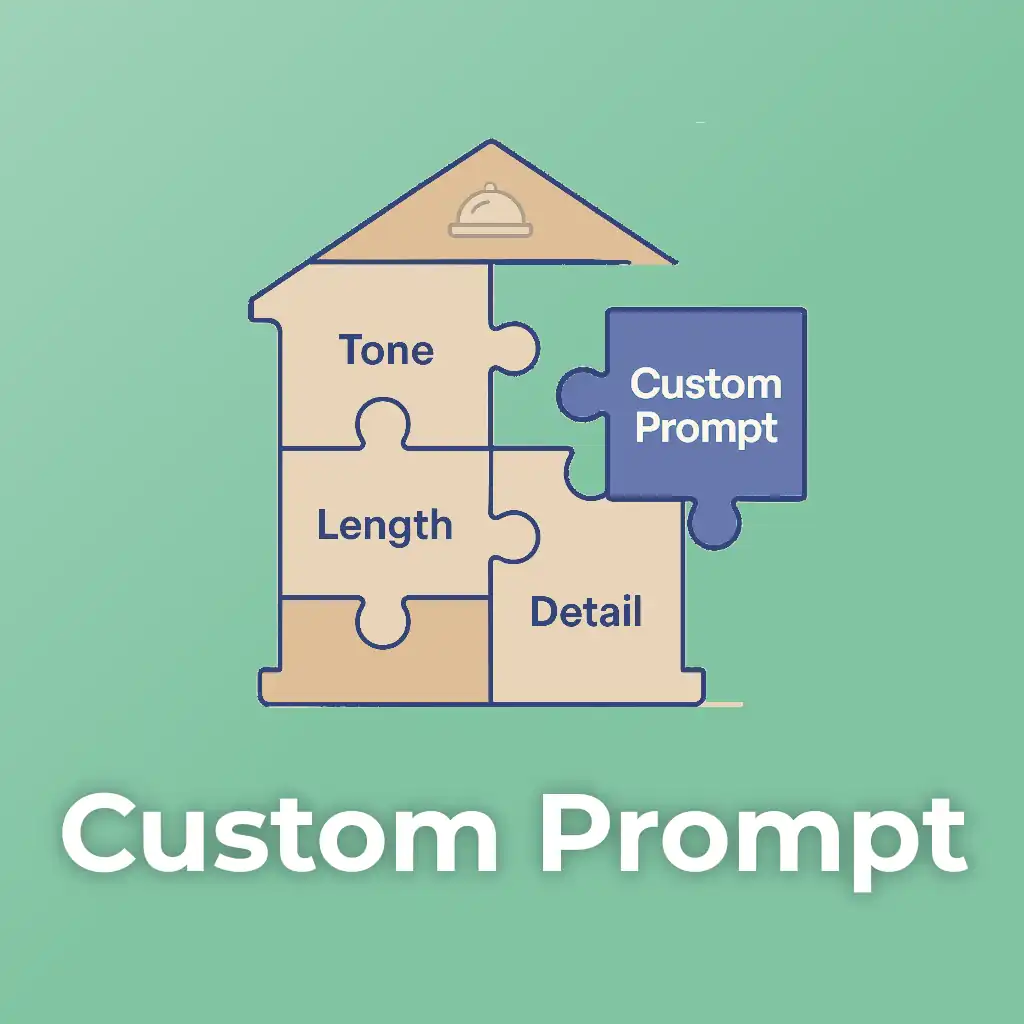Focus Chat Connects Intent to Specialists on Travel Websites
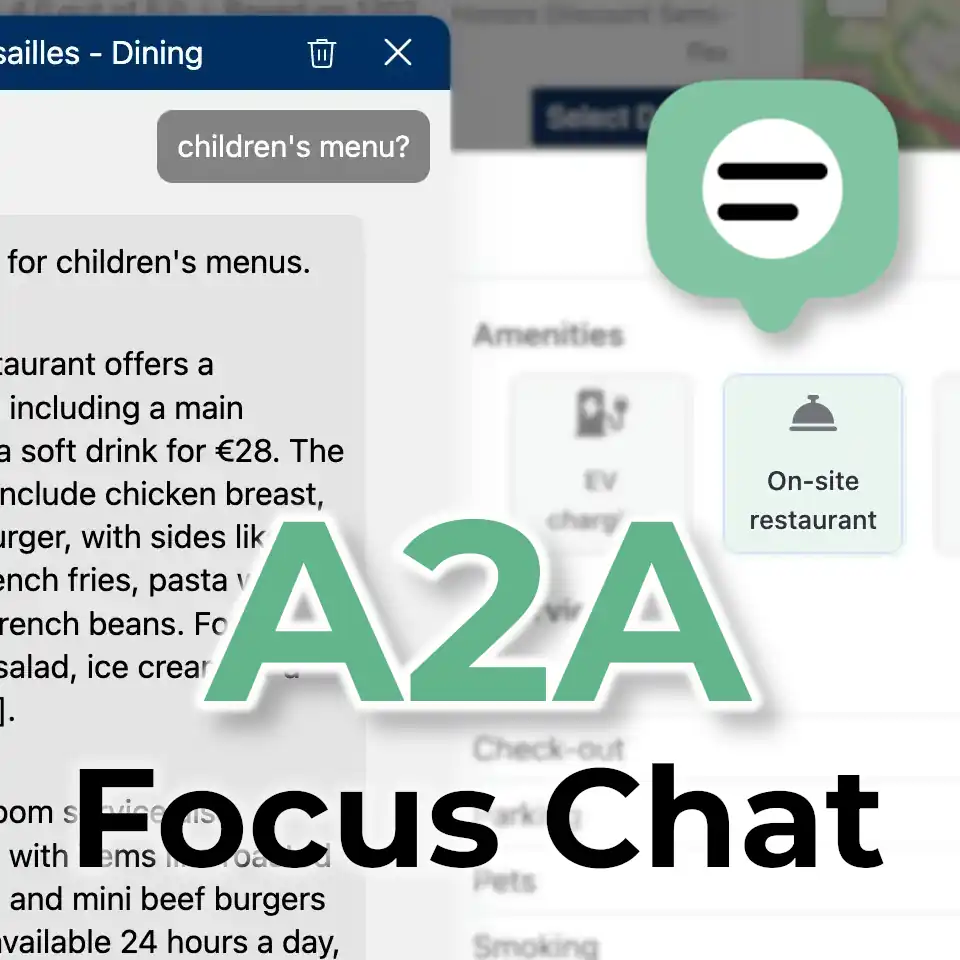
Hotel and travel websites cause friction, confusion, and lost revenue. Even with AI chatbots.
- Guests do not want 40+ clicks to book. They want facts in place.
- Travelers are not prompt engineers, short inputs should work.
- Hoteliers do not want to maintain multiple siloed knowledge bases.
- A static dining, golf, spa, or gym icon tells little and creates no upsell moment.
Imagine a hotel website where each page, section, and amenity icon becomes a doorway to a contextually aware conversation with the right hotel specialist, or where travelers can chat with any listed property from a portfolio page. That is the idea behind Focus Chat, a widget that matches guest intent with the right team's AI agent.
Why context matters
Context engineering gives AI the local signals it needs: where the visitor came from, what they are looking at, and which hotel role should respond. The website exposes the departmental agent that matches that context, for example Reservations, Dining, Events, Golf, or Spa. That two-way alignment of demand and supply mimics human conversation and produces better outcomes.
When AI understands intent it:
- Provides authoritative, property- and role-specific answers instead of vague replies.
- Anticipates sensible follow-ups and suggests precise next steps.
- Removes friction so guests complete bookings faster.
- Handles very short inputs, including single words, so travelers do not need to learn prompt engineering.

What is Focus Chat?
Focus Chat is a free, lightweight website widget that connects visitors with the right AI agent for a hotel, travel agency, or destination, enabling real-time, context-aware conversations. It goes beyond page-level bots by turning portfolio listings, page sections, and amenity icons into direct gateways to specialist teams.
Key product points:
- Connects to your existing agents, not a separate knowledge base.
- Respects UX with a smart tooltip that surfaces context-aware detail on demand.
- Agent2Agent compatible and can invoke any A2A-compliant agent you already run.
- Installs with a one-liner script reference and has minimal performance impact.
- At launch supports text; voice and video are planned.
- Free to deploy on modern websites.
How Focus Chat solves the problems
❗ Guests face 40+ clicks and fragmented info
✓ Focus Chat answers property-specific questions in place
❗ Travelers are not prompt engineers
✓ Focus Chat uses local signals so short inputs work
❗ Conflicting info across OTAs, review sites, and pages
✓ Focus Chat connects queries to the hotel’s departmental agent, the authoritative source
❗ Static amenity icons create no upsell moment
✓ Amenity icons become live gateways to specialists who explain offers and add-ons
❗ Slow or missing pre-stay replies
✓ Real-time agent responses handle common questions and route complex issues for follow-up
❗ Maintenance overhead from siloed knowledge bases
✓ Focus Chat uses your existing departmental agents, avoiding a new content silo
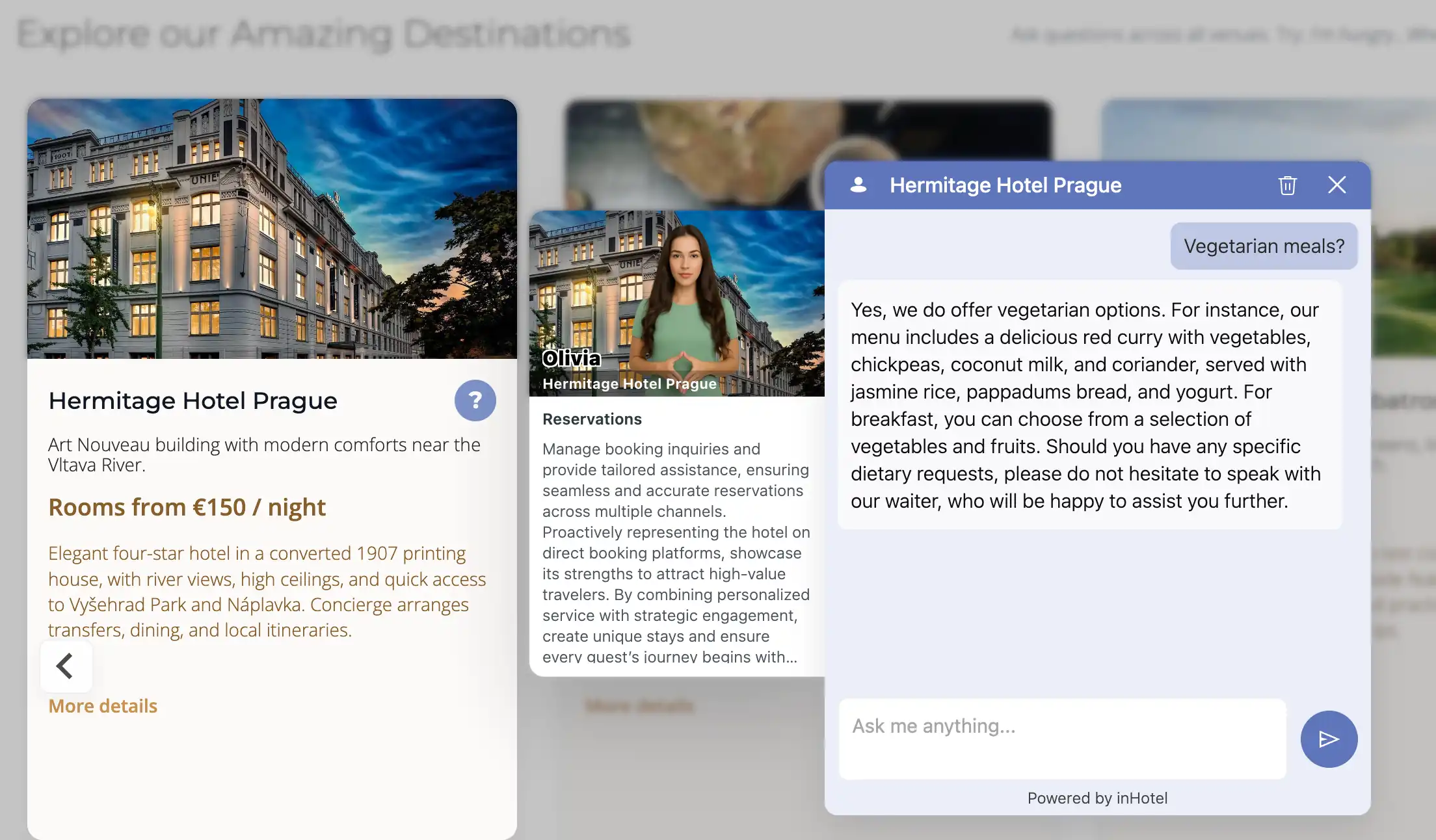
Where Focus Chat shines
- Brand portfolio and search-result pages: Enable chat before travelers land on a property, so they can ask about availability, distance, or comparative perks without clicking through.
Example: On a portfolio page, each listing shows a chat icon that opens the hotel’s Reservations agent. - Hotel detail and amenity sections: turn icons and sections into live specialist gateways for Rooms, Dining, Events, Gym, Spa, Parking, Golf, and more.
Example: Click the dining icon to chat with the F&B agent about tonight’s menu or private dining options. - Rate comparison blocks: explain ancillaries and surface relevant upsells in context when travelers are evaluating prices.
Example: In a rate table, a chat prompt explains the included breakfast policy or a refundable rate difference. - Reservation flows: keep travelers in the conversion funnel by answering quick questions without forcing navigation away from checkout.
Example: A chat on the confirmation page clarifies early check-in options and available upgrades. - Dual-focus outlets (locals and travelers): use one agent across channels so restaurants, spas, gyms, and parking serve locals and guests with consistent answers.
Example: The same F&B Assistant answers walk-in diner questions and hotel guest queries about set menus.
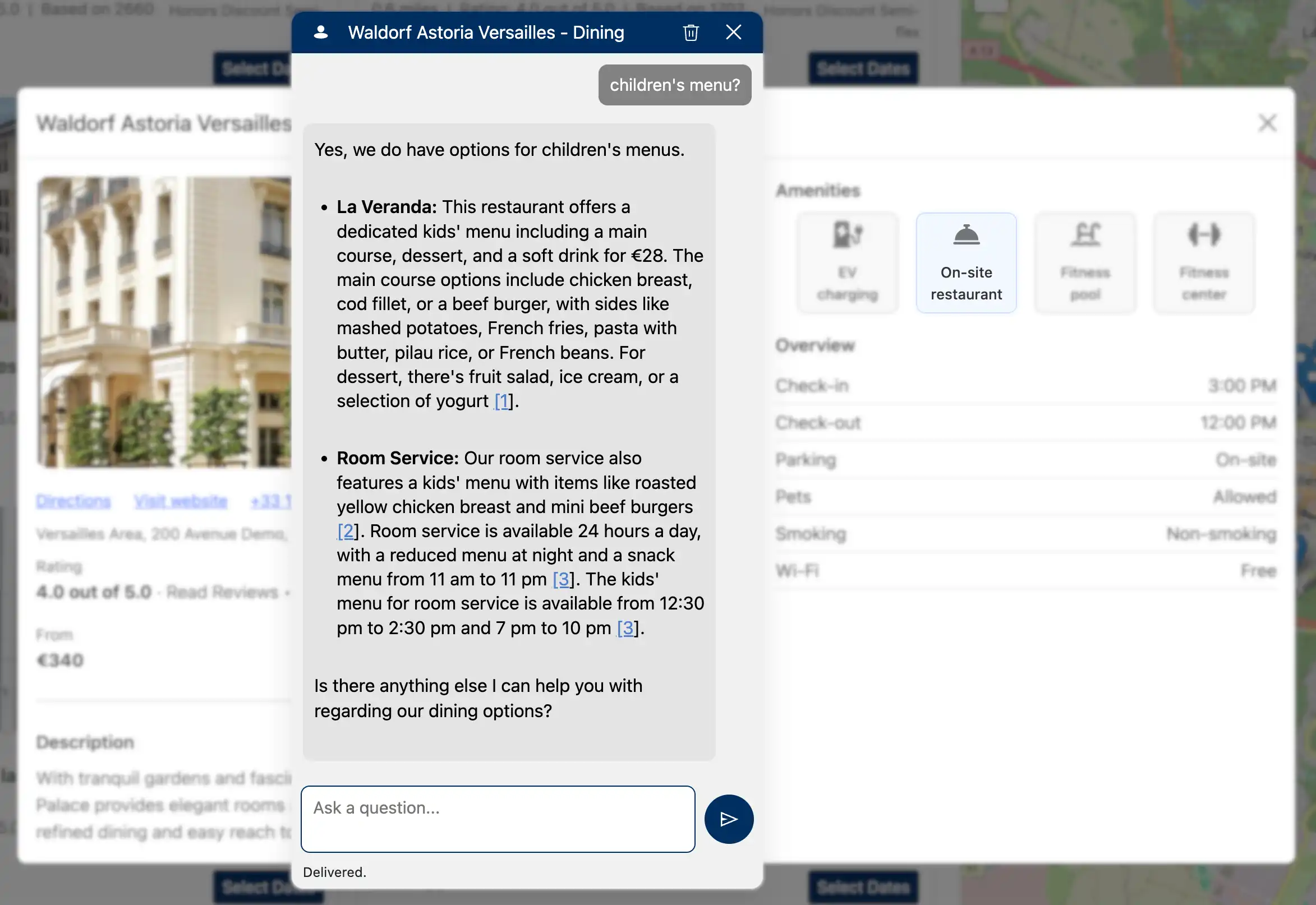
Agent capabilities beyond chat
Focus Chat is built for agents, not chatbots. Because it invokes the agent that represents a venue or even a department, it can surface any capability the target agent supports, subject to configuration and permissions. Typical agent skills include advising on availability and rates, explaining package and ancillary options, negotiating add-ons or group offers, and guiding booking decisions. At launch Focus Chat supports text only; voice and video modalities are planned for future releases.
Configuration
Focus Chat supports the Agent2Agent (A2A) protocol. Implementation is simple, lightweight, and compatible with modern web stacks. Website admins can customize visual styles, greetings, tooltip behavior, and the context signals passed to the agent. A single page can host many Focus Chat instances. Each placement can be tuned independently so portfolio cards, amenity icons, and rate tables use the right agent and presentation.
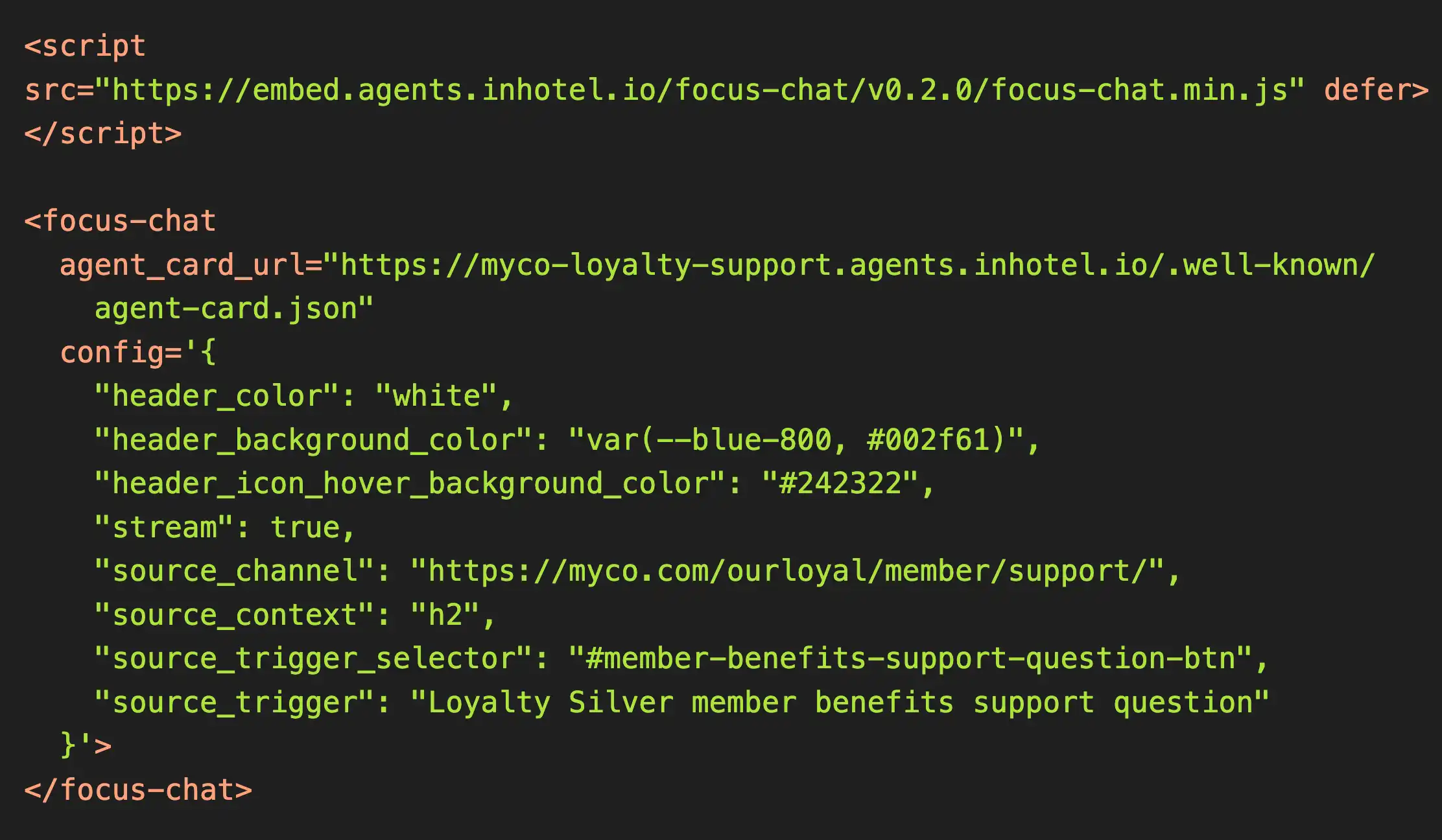
While Focus Chat works with any A2A-compatible agents, inHotel customers get extra convenience: Focus Chat automatically pulls the referenced agents' Personality config and account defaults from a central place, speeding onboarding and keeping behavior consistent. Admins can manage agent settings in the portal and apply per-instance config overrides for specific placements when different styling, greetings, or context are needed.
In addition, inHotel agents receive source metadata in a structured envelope, not mixed into the user’s messages. The agent reads source_channel, source_context, and source_trigger separately, which improves intent recognition and makes behavior more precise. This also enables operational workflows beyond chat, for example prioritizing questions from loyalty member pages, tagging inquiries that originate from an email campaign, or kicking off tasks like quotes or follow-ups based on the trigger.
See the technical documentation for a full parameter reference, examples, and privacy details.
Get started
All inHotel customers and partners can deploy Focus Chat on their websites and connect it to their assistants and AI personas starting today. 🎉
If you're ready to turn amenity icons into conversion engines or add smart tooltips that help prospective guests make the right decision and book on your website, configure your AI assistants and drop <focus-chat> tags strategically on your pages.
Which AI chatbot or agent is best for hotel brand websites?
Look for a bot that supports multi-property contexts on portfolio and search-result pages, not just single-property pages. inHotel’s Focus Chat lets each listing expose its own departmental agent, so a traveler can chat with the Reservations team of Property A or the F&B team of Property B without leaving the results. It passes context, provides authoritative answers per property, and keeps visitors in the brand site rather than bouncing to third parties.
How do we clarify rates and ancillary fees during comparison?
Place a context-aware chat trigger next to the rate table. With inHotel’s Focus Chat, the agent explains breakfast inclusion, refund rules, parking fees, or upgrade options in plain language, which reduces confusion at a critical decision point.
What is the best way to support hotel pre-stay questions at scale?
Use a departmental-agent model that answers instantly and escalates edge cases. inHotel’s Focus Chat handles common requests in real time and can route complex items for follow-up, reducing email backlogs and call volume.
How does context engineering improve intent detection in travel and hospitality?
It supplies signals like source channel, page section, and trigger. inHotel’s Focus Chat sends a structured envelope with `source_channel`, `source_context`, and `source_trigger`, so AI agents infer intent more precisely and respond with the right detail.
How do we use a single restaurant or spa AI agent across channels?
Hotels can deploy one departmental agent and expose it wherever needed. inHotel’s Focus Chat lets the same F&B agent serve walk-in questions, hotel site dining pages, and portfolio listings, which keeps answers consistent and avoids content and cost duplication.
How can we measure inHotel Focus Chat’s impact on direct bookings and upsells?
Give each placement a unique source_channel and pass source_trigger so chats are attributable. Track these core KPIs: conversion rate after chat, time-to-book, average booking value, ancillary attach rate, and revenue per session. Run an A/B or holdout test (pages with and without Focus Chat) to measure lift and calculate statistical significance. Use cohort and funnel analysis to isolate lift by placement (rate table, portfolio, confirmation). Focus Chat supplies structured source metadata so you can attribute uplift directly to contextual chat placements.
How fast can we implement inHotel Focus Chat on an existing site?
Focus Chat is a drop-in widget, which makes the implentation quick and easy. The widget adds a one-liner script per page and HTML tags for each placement. You can start with a few strategic spots, then expand to portfolio cards, amenities, and rate blocks.
Which AI chatbot or agent is best for OTA, meta-search and loyalty program booking websites?
For OTAs, loyalty program and meta-search pages you need a solution that supports multiple distinct entities on one page and can attach the right agent to each listing. inHotel’s Focus Chat is built for that pattern: each search result or card can expose its own AI agent so a traveler can chat with the Events team of Property A or the Reservations team of Tour Operator B without leaving the results. It passes local context, returns property-specific, authoritative answers, and is lightweight so it does not slow down listing pages. Prioritize A2A compatibility, per-listing context, minimal performance impact, and click-forwarding so chats feel immediate and relevant.
Which AI chatbot or agent is best for a DMO website?
A DMO should use a conversational layer that can surface both destination-level expertise and links to member properties and experiences. Look for a widget that can host destination agents for general queries while exposing partner property or operator agents where needed. inHotel’s Focus Chat supports portfolio-style deployments and can present destination FAQs, visitor itineraries, attraction details, and route users to hotel or tour agents with structured source metadata. Prioritize multilingual support, easy content governance for many stakeholders, analytics for campaign attribution, and a way to highlight commercial offers without disrupting the visitor experience.
Is there a free A2A AI agent chatbot for travel and hospitality websites?
Yes. inHotel Focus Chat is a free chat widget built for travel and hospitality. It connects visitors to A2A-compatible AI agents, so hotels, restaurants, travel agencies, tour operators, DMOs, and experience venues do not have to build new knowledge bases. Add one script and a simple <focus-chat> tag with the agent card URL. The widget reads local context from portfolio listings, page sections, and amenity icons, so short questions like “parking” or “price?” get accurate answers. Use it on search listing and portfolio pages, rate tables, and amenity sections to reduce clicks and increase conversions. It is lightweight, fast, and supports text today, with images, voice and video planned.

